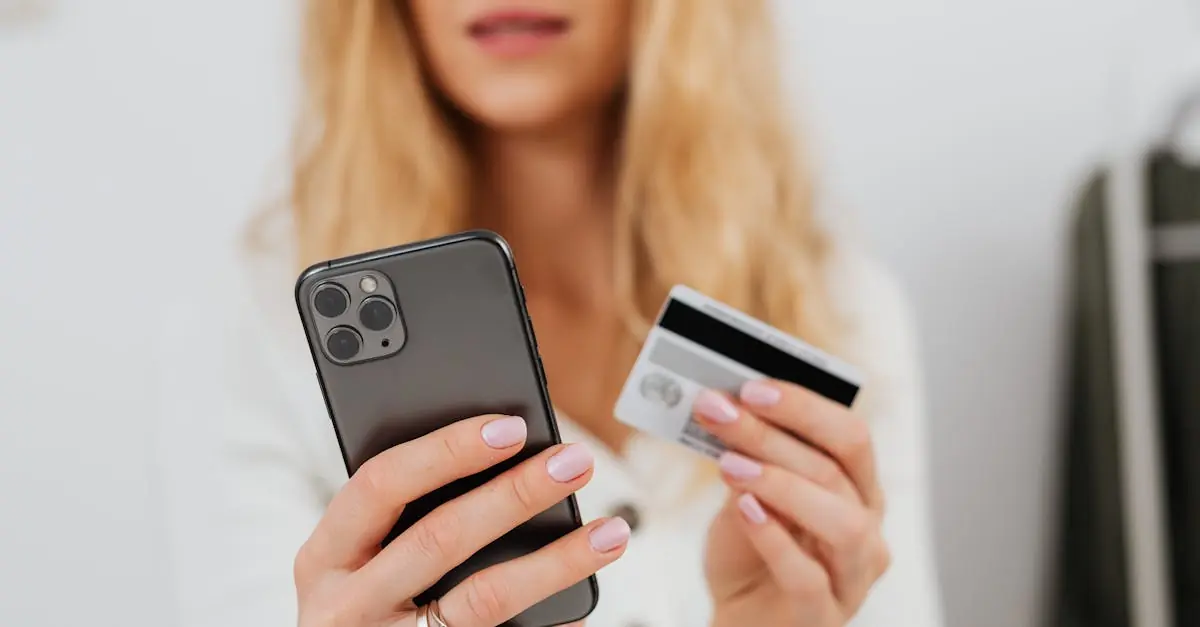In a world where cyber villains lurk behind every digital corner, the question “Do I need security on my iPhone?” is more relevant than ever. Picture this: your iPhone is a shiny fortress, but without the right security measures, it’s like leaving the drawbridge down while inviting hackers for tea. Who wouldn’t want to keep their personal data safe from those pesky digital pirates?
Table of Contents
ToggleImportance Of Security On iPhones
Securing an iPhone is crucial in protecting personal data from increasing cyber threats. Users often overlook the need for comprehensive security measures.
Understanding Mobile Security Threats
Cyber threats can take many forms, including malware and phishing attacks. Hackers exploit vulnerabilities in applications and operating systems to gain unauthorized access. Public Wi-Fi often exposes devices to security risks, as attackers may intercept communications. Users must stay vigilant about suspicious links and app downloads. Awareness of these threats fosters a proactive security mindset, mitigating risks.
Common Vulnerabilities In iPhones
Common vulnerabilities include outdated software and weak passwords. Many users neglect regular software updates, which may contain essential security patches. Additionally, using easily guessable passwords leaves devices open to unauthorized access. Unverified applications in the App Store can introduce risks, with some hiding malicious code. Users should utilize features such as two-factor authentication to enhance security. Prioritizing these measures significantly reduces the likelihood of security breaches.
Built-In Security Features Of iPhones
iPhones come equipped with several built-in security features designed to protect users’ data and privacy.
Face ID And Touch ID
Face ID and Touch ID provide biometric authentication, offering a secure way to unlock devices and authorize purchases. Face ID uses advanced facial recognition technology, mapping over 30,000 invisible dots on the user’s face. This system adapts to changes in appearance, ensuring reliable access. Touch ID utilizes a fingerprint sensor, reading the unique patterns of a user’s fingerprint. Both features enhance security by preventing unauthorized access, significantly reducing the risk of identity theft. Users benefit from these conveniences that eliminate the need for complex passcodes while maintaining a high level of protection.
Encryption And Data Protection
Encryption protects sensitive data stored on iPhones, safeguarding it from unauthorized access. Data is automatically encrypted using strong algorithms, ensuring that even if a device is lost or stolen, the information remains secure. Messages and calls made through iMessage and FaceTime are also end-to-end encrypted, further fortifying privacy. Users can enable features like “Find My iPhone,” which helps track lost devices and remotely erase personal data. Regular software updates include essential security patches that maintain the integrity of data protection measures. Relying on these built-in features empowers users to keep their information secure in an increasingly digital landscape.
Third-Party Security Options
Exploring third-party security options can enhance an iPhone’s built-in protections. Users often consider additional layers of security to safeguard their personal data.
Antivirus Apps For iPhones
Antivirus apps designed for iPhones offer proactive threat protection. These applications scan for malware and other security threats, providing real-time monitoring. Many reputable options are available in the App Store, which can help identify malicious websites and downloads. Users need to choose antivirus solutions that focus specifically on iOS, as these apps are optimized for the operating system’s architecture. Certain antivirus applications include features like privacy monitoring and file encryption, further bolstering device security.
VPNs And Their Benefits
VPNs (Virtual Private Networks) provide privacy and security when using public Wi-Fi. They encrypt internet traffic, preventing unauthorized access. Users benefit by safeguarding personal data, especially during online banking or shopping. Many VPN services create a secure tunnel, making it difficult for hackers to intercept sensitive information. Additionally, some users appreciate the ability to bypass geo-restrictions, obtaining access to content not available in certain regions. Choosing a trustworthy VPN service is crucial, as it enhances protection against various cyber threats.
Best Practices For iPhone Security
Implementing strong security measures enhances an iPhone’s protection against threats. Adopting best practices ensures personal data remains secure in a digital environment.
Regular Software Updates
Updating software represents a critical step in maintaining iPhone security. Each update delivers essential patches that fix vulnerabilities and strengthen defenses. Ignoring regular updates increases the risk of exploitation by cybercriminals. Activating automatic updates simplifies the process, ensuring the device always runs the latest software version. The settings menu provides an easy way to enable this feature. Staying vigilant about updates is vital for maintaining optimal security.
Managing App Permissions
Controlling app permissions plays a significant role in securing personal information. Users should regularly review which applications have access to sensitive data. Disallowing unnecessary permissions helps reduce the risk of data breaches. Each app should only collect information necessary for its functionality. Adjust settings in the privacy menu to customize permissions according to specific needs. Making informed choices about app access keeps sensitive data safe from potential threats.
Prioritizing security on an iPhone is essential in today’s digital landscape. Users must remain proactive to safeguard their personal information from ever-evolving cyber threats. Utilizing built-in features like Face ID and encryption is a great start, but it shouldn’t stop there. Regularly updating software and managing app permissions are crucial practices that can significantly enhance security.
Incorporating third-party solutions like reputable antivirus apps and VPNs can further fortify defenses. By staying vigilant and informed about potential risks, users can create a more secure environment for their data. Ultimately, taking these steps not only protects personal information but also fosters peace of mind in an increasingly connected world.




